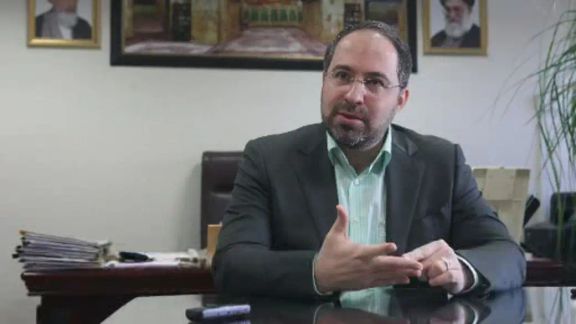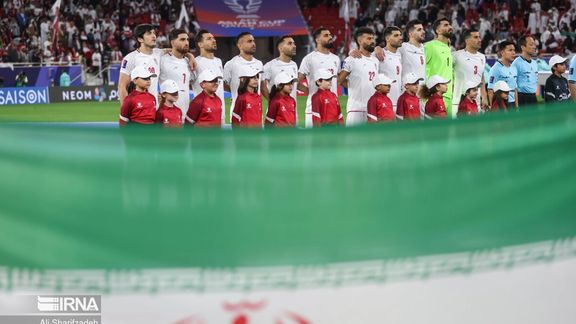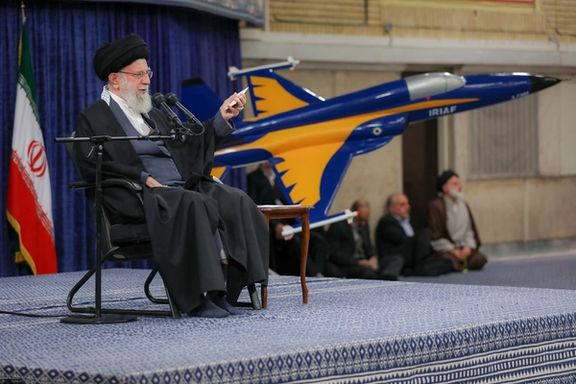Swedish Diplomat's Sister Decries Brother's Detention In Iran

The sister of Johan Floderus, the Swedish EU diplomat detained in Iran, has condemned his captivity as a manipulative act within a larger “political game.”

The sister of Johan Floderus, the Swedish EU diplomat detained in Iran, has condemned his captivity as a manipulative act within a larger “political game.”
Floderus, 33, was detained by Iranian authorities in April 2022 at Tehran airport following a visit to a friend working at the Swedish embassy. Since then, he has been subjected to distressing conditions in Evin prison.
At the time of his arrest, Floderus was employed on the Afghanistan desk of the European External Action Service (EEAS), the diplomatic arm of the European Union.
Reports emerged last Sunday indicating that the Iranian prosecutor is seeking the death penalty for Floderus on charges of espionage for Israel and "corruption on earth," a capital offense under Tehran's Islamic laws.
Floderus becomes the latest victim of what many term “hostage diplomacy”, where Western citizens are arbitrarily detained by the Iranian regime on unfounded espionage charges. While previous detainees have been released following concessions by Western governments, the prosecutor's push for the death penalty has stunned Floderus' family.
Speaking to Euronews at a #FreeJohanFloderus campaign event in Brussels, his sister Ingrid Floderus emphasized his innocence, stating, "He is an innocent man. I don't think that anyone really feels like my brother has done those crimes that he has been accused of."
She added, "This is about some big political game where my brother is being used as a pawn, and that is really, for me, something I cannot accept."
Floderus, an alumnus of Oxford University, is believed to be caught in a web of political pressure aimed at the Swedish government. Observers suggest his detention could be linked to Tehran's efforts to coerce the release of Hamid Nouri, a former judicial official of the Islamic Republic, sentenced to life imprisonment for his role in the 1980s political prisoner massacre, which saw the execution of up to 5,000 individuals.

The second court session was held in Canada Thursday to decide if Salman Samani, a former senior official of Iran's Interior Ministry, should be expelled from the country.
Lasting for six hours, the session saw notable revelations, including Samani asserting his role as a “servant of the people rather than the government of the Islamic Republic.”
Samani, intruding himself as a dentist in Canada earning a modest income, appealed to the Canadian government, which is trying to deport Canada-based Iranians with links to the Islamic Republic.
The legal saga began when Samani's name appeared on a list of individuals announced by the Canadian Border Security Agency on December 7, mandating their deportation from Canada. The action triggered a legal battle, with Samani filing a request with the Federal Court of Canada.
The deportation is in line with sanctions implemented in November 2022, preventing senior members of the Iranian regime from entering Canada.
The measures were imposed after Iran's morality police killed Mahsa Amini for defying hijab laws. Amini's death garnered international condemnation and became a symbol of resistance against the repression of women under Iran's clerical regime.
Last week, Majid Iranmanesh, the former director general of Iran’s Vice-Presidency for Science and Technology,was given a final expulsion order from the Canadian Immigration and Refugee Board about. Iranmanesh is the first among nine former officials whose expulsion cases have been reviewed.
Canada severed diplomatic ties with Iran in 2012 due to concerns related to its pursuit of nuclear weapons and support for terrorist organizations including Hamas, whose invasion of Israel on October 7 ignited the current conflict in the Middle East.

Iran’s defeat to Qatar in Asian Cup 2024 soccer tournament has once again underscored the profound rift among Iranians, some of whom rejoiced over the national team’s loss.
Qatar, the host of the games, beat Iran 3-2 in semi-finals in Doha on Wednesday. In the aftermath of the match, some Iranians took to the streets in cities like Sanandaj, Javanroud, Ahwaz, and Qazvin, celebrating with singing and dancing. Meanwhile, on social media platforms, others exchanged congratulations over the team's loss, expressing a disassociation from a squad they no longer perceive as their own, branding it as the "Mullahs' team."
Cars honking in Sanandaj after the national team’s loss against Qatar
“The team of the mullahs lost and now its supporters are saying those who are happy about the loss of their country's team are not [patriotic] Iranians. The answer to them is that this team is not the ‘national’ team and will never be,” an X post said. “There is a sea of blood between you and us that will never dry up before you are gone.”
Some other Iranians accused the opponents of the national team of not being patriotic.
“Although we lost, the Iranian flag still flies high, carried by the resounding chants of the Islamic Iran's glorious national anthem on the lips of our Iranian cheetahs [= squad]... Let's not forget that just last [Iranian] year, following Iran's defeat, the unpatriotic slaves [of the enemies] were cheering loudly,” one of them wrote on X, referring to protesters celebrating the team's exit from the FIFA 2024 World Cup in Doha amidst the Woman, Life, Freedom movement.
people rejoicing the national soccer team’s loss in Javanroud
The unsympathetic attitude of those who celebrated the once popular squad was a reaction to what they believe is the team members’ lack of solidarity with protesters.
Other athletes in 2022-2023 had reacted to the regime’s suppression of protesters by refusing to sing along with the national anthem or cheer at international competitions as did the volleyball, beach football, water polo, and basketball teams despite authorities’ threats. Most of the soccer squad did the same before one match, but were apparently intimidated into silence and submission after that.
People dancing in Qazvin and honking cars
“We are completely different from the rest of the world in two ways: Firstly, we are the only people who wish to return to their past. Secondly, we are the only people who rejoice the loss of their country's sports teams. There is only one reason for this: Hatred of the regime,” one of the many comments on X said.
Another post responded to those who say people of other countries would never rejoice over their national teams’ loss by arguing that other countries would not shoot down civilian airliners, as did the Revolutionary Guards (IRGC) on January 8, 2020, or kill teen protesters such as Nika Shakarami and Sarina Esmaeilzadeh, and claim they had committed suicide, as the regime did during the 2022 protests.
People honking cars and chanting in Shelangabad neighborhood of Ahwaz
However, this was not always the case. Since the FIFA World Cup matches of 1998, it had been a tradition to take to the streets to celebrate the national soccer team's victories, but fans and others had never "celebrated" the team's losses before.
At the height of the Woman, Life, Freedom protests of 2022, however, thousands took to the streets in various Iran cities on November 29 to celebrate the national soccer team’s elimination from the World Cup in a match against the United States.
The squad of the DR of Congo protesting to armed violence in their country
Security forces responded harshly to this unprecedented reaction from the populace and a young man, Mehran Sammak, was shot in the head in the northern city of Anzali while honking his car like many other protesters.
"This is how a national team should act," another post remarked, citing the protest action of the Democratic Republic of Congo's national team members. They covered their mouths and formed their fingers into a gun, placing it against their temples during the national anthem to raise awareness of the armed violence in their country.

Swiss police killed a 32-year-old Iranian asylum seeker who held 15 hostages for several hours on a train using an axe and a knife on Thursday.
The incident occurred between Baulmes and Yverdon-les-Bains in western Switzerland, with the man holding the passengers captive for almost four hours until police stormed the train late on Thursday evening.
According to reports from Vaud police, the hostage-taking began around 6:35 pm local time, when the assailant, speaking Farsi and English, forced the train engineer to abandon his post and join the 14 passengers onboard. The train was immobilized with its doors closed at the Essert-sous-Champvent station, between Baulmes and Yverdon-les-Bains.
Authorities were alerted by passengers directly, leading to the sealing off of the area to facilitate negotiations with the hostage-taker.
The intervention occurred when the perpetrator was separated from the hostages, as stated by Jean-Christophe Sauterel, spokesperson for the Vaud cantonal police. “As the hostage-taker rushed with his axe in the direction of the intervention group, a police officer used his weapon to protect the hostages, fatally hitting the perpetrator,” explained Sauterel. Despite the presence of a doctor among the police team, the man died at the scene, with police asserting that they acted in self-defense.
The Vaud Public Prosecutor's Office has started a criminal investigation into the incident. Attorney General Eric Kaltenrieder stated, “The man's motivations have not been established, nor his psychological state.”
Switzerland is relatively safer among European countries, and hostage-taking incidents of this scale are very rare in the country.
In December, Arman(d) Rajabpour Miyandoab, an Iranian-French national, was arrested in Paris during a deadly knife attack on people.
Rajabpour's social media account, which was opened in the same month on the X platform, contained "many posts about Hamas, Gaza, or generally Palestine."

The Tehran Appeals Court has upheld an eight-year prison sentence for Assadollah Fakhimi and Hoorieh Khanpour, a couple known for their civil activism.
The ruling, issued on February 6th, includes a five-year prison term for Fakhimi and three years for Khanpour on charges of “assembly and collusion with intent to commit crimes against national security.”
The verdict also includes one-year sentences for each of them on charges of “propaganda against the system.”
Initially handed down by Tehran Revolutionary Court, in January, the eight-year sentence against the couple has been fully confirmed by the appeals court.
The home of Fakhimi and Khanpour was raided by agents of the ministry of intelligence on July 11 last year, during which computers, laptops, and mobile phones were seized, and the couple was subsequently summoned to Evin Courthouse.
In a notable act of solidarity, on October 29th, Fakhimi, alongside several other civil activists and families of detainees, visited the family of imprisoned human rights activist Narges Mohammadi, a recipient of the 2023 Nobel Peace Prize, presenting a Human Rights Statue.
Since its establishment, the Islamic Republic has consistently arrested, tortured, and imprisoned government critics, civil and political activists.
Since the nationwide uprising against the Islamic Republic in September 2022, the government's crackdown on civil, political, and protesting activists has persisted and intensified.

The United States and Israel should tell Iran it risks an “overwhelmingly powerful strike” if it moves to make a nuclear weapon, leading weapons expert David Albright told Iran International.
In an interview on Thursday, Albright warned that a “convergence of factors” means “this is the time that “Iran may decide to make nuclear weapons.”
“You have a situation where the security incentives for Iran to build nuclear weapons have increased,” he pointed out. “The transparency of the nuclear program has decreased significantly.. Their nuclear weapons capabilities have grown over the last several years… And it's also a point in time where people's attention is elsewhere. The Iran nuclear issue barely makes the newspapers these days.”
David Albright is a world leading weapons expert and the founder of the Institute for Science and International Security. He was associated with the UN's International Atomic Energy Agency (IAEA) in the late 1990s and raised questions about the evidence that led to the US invasion of Iraq in 2003.
Speaking with Iran International’s Fardad Farahzad, Albright called the current moment “a point of extreme danger”, where Iran can make a “crude” nuclear explosive in six months.
“By crude I mean, you can't put it on a ballistic missile and hope that it will survive,” he said. “But it would work underground as a test. And most importantly, it would just signify through, say, a week that Iran was a nuclear weapons power.”
In the past two decades, every US president has announced that a “nuclear Iran” will not be tolerated, often stressing that “all options are on the table” to prevent the regime in Tehran acquiring nuclear weapons. And in the meantime, Iran has advanced its nuclear capabilities in every respect.
The argument in some policy circles is that Iran would have to do tests to become ‘nuclear' and that would give the US government (or Israel) the time it needs to find a response. But Albright believes the evidence suggests otherwise.
“Iran does not need to do a nuclear test to build a nuclear weapon,” he said. “Their original weapons program that ended around 2003 was a program that was designed to avoid the need to conduct a ‘full scale’ test… they can test the components, the subcomponents, and then test the whole assembled device minus the weapons grade uranium, and have a way to know if that test was successful, which we call a cold test.”

There is no evidence at the moment to suggest Iran has had a ‘cold test.’ But it is something that can happen with relative ease and in a short time, according to Albright.
Which leads, inevitably, to the question: is there anything that can be done?
“President Biden, backed up by the Israeli government, should say that we are watching you, Iran, even though we have other priorities,” Albright said. “and if you move to make nuclear weapons, we're going to launch an overwhelmingly powerful military strike.
“And that's desperately needed is to empower the IAEA. They're the people on the ground that can look for suspicious activities. If Iran is going to make a nuclear weapon, it's going to have to divert at some point in the six month process the enriched uranium. And the IAEA can look for indications of diversion, insist on being at the sites, resist being excluded from the sites.”
But would any of these work?
“We know from past experience that Iran won't give in completely to this kind of pressure,” Albright said, “but it does get nervous. And that's part of the purpose is to throw the Iranian regime off balance and then in parallel, make sure that the Iranian regime understands that overwhelming military force could be applied.”
There is another side to this ‘threat’, though: it could convince the Iranian regime that it could survive only if it becomes a nuclear power –like North Korea, as some ultra hardliners in Iran would like to say.
But Albright believes a “balancing act” is possible if the US and Israel move swiftly to make the regime understand “it's not in its interest to build nuclear weapons” before it reaches a definite conclusion that it has to have “nuclear deterrent” against the US and Israel.
“We're worried that the US and Israeli intelligence agencies are distracted,” Albrighrt told Iran International, “and Israeli intelligence isn't foolproof, as this attack on October 7th proved in a very dramatic way.